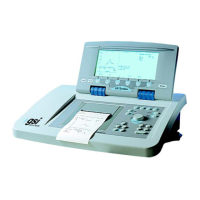Chapter 3
8) A“Test Complete Remove Probe” message will appear on the display
when the test is complete.
9) View test results on the graphic display area along with summary data at
the right of the pressure and compliance meters.
1) Select test mode by pressing REFLEX.
2) Default test parameters are displayed above softkeys on the LCD.
A) Selectable Probe Tone Frequencies- 226 Hz, 678 Hz, 1000 Hz.
B) Selectable Admittance Components- Y, B, G.
C) AUTO ZERO is used to baseline admittance between stimulus
presentations.
NOTE
Reflex responses may be inverted, or deflected in an upward direction
when using higher probe tones. Direction of response may also differ
when testing with Y, B or G components.
D) Alternative sensitivities for displayed reflex response may be selected
by pressing the ml SCALE softkey.
3) Press START to pressurize the ear to dynamic peak pressure maintained
from last tymp, or to 0 daPa if no previous tymp data is available.
Pressure
control is active for fine-tuning pressure if tymp is sharply sloped, i.e.,
offset from peak by 10 to 15 daPa.
4) Select intensity of stimulus by pressing the INTENSITY up or down
arrows. Press the STEP SIZE softkey to set 1, 2, or 5 dB steps.
5) Present auto-timed stimulus by momentarily pressing the PRESENT bar.
(Stimulus may also be presented with manual timing.)
6) Press ERASE to erase sub-threshold presentations or unwanted data,
i.e.,
amplitudes of less than 0.02 ml with 226 Hz, 0.06 mmhos with
678 Hz, or 0.09 mmhos with 1000 Hz.
7) Press the CONTINUE softkey to allow reflex tracings to continue onto the
next line of reflex screen and onto the next page in memory.
NOTE
When CONTINUE is selected, test results are stored in memory and may
not be erased.
8) The STIMULUS up and down arrow hardkeys are used to select
alternative test stimuli.
9) The CURSOR softkey may be used to examine data points from individual
tracings.
10) If Reflex Decay, ARLT, or AR Sensitization testing is to be done on the
same ear, press the SPECIAL hardkey without pressing STOP. This
allows the pressure from Reflex Threshold to be maintained for the next
test
. If not, press STOP to terminate testing.
Grason-Stadler

